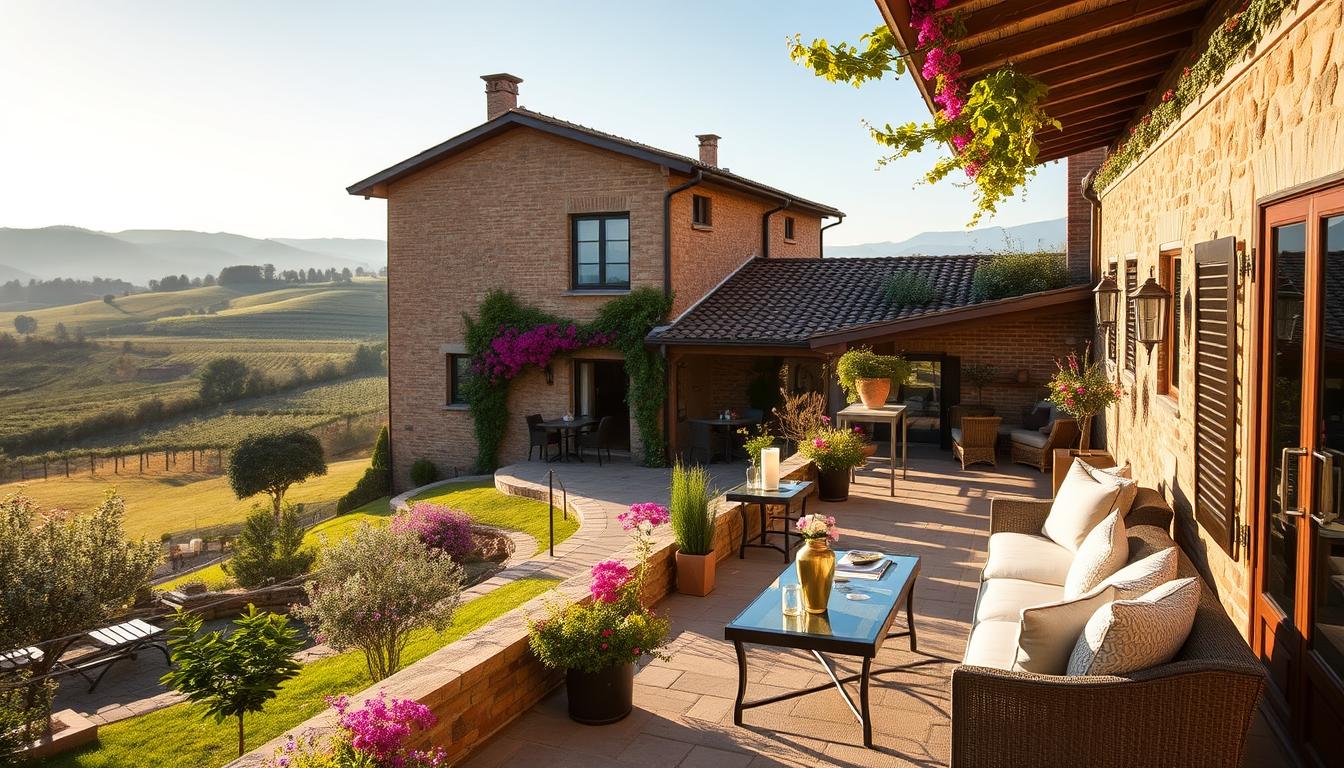Tuscany is known for its stunning views and deep culture. It’s a perfect place to start a boutique hotel. These hotels are special because they offer a close, personal feel and unique design. They make sure guests have a memorable stay.
This guide helps those who want to open a boutique hotel. It covers the basics of the hotel business. It also gives tips on starting a successful hotel in Tuscany. If you’re thinking about starting a boutique hotel, this guide will help you get started.
Key Takeaways
- Tuscany’s scenic beauty makes it an attractive location for boutique hotels.
- Boutique hotels offer a unique guest experience that sets them apart from larger chains.
- Understanding the local culture is key to creating a successful boutique hotel.
- A comprehensive business plan is essential when launching a hotel.
- Personalised service is vital for building customer loyalty.
- Collaboration with local businesses can enhance guest experiences.
- Staying competitive requires regular evaluation and adaptation of strategies.
Understanding the Boutique Hotel Concept
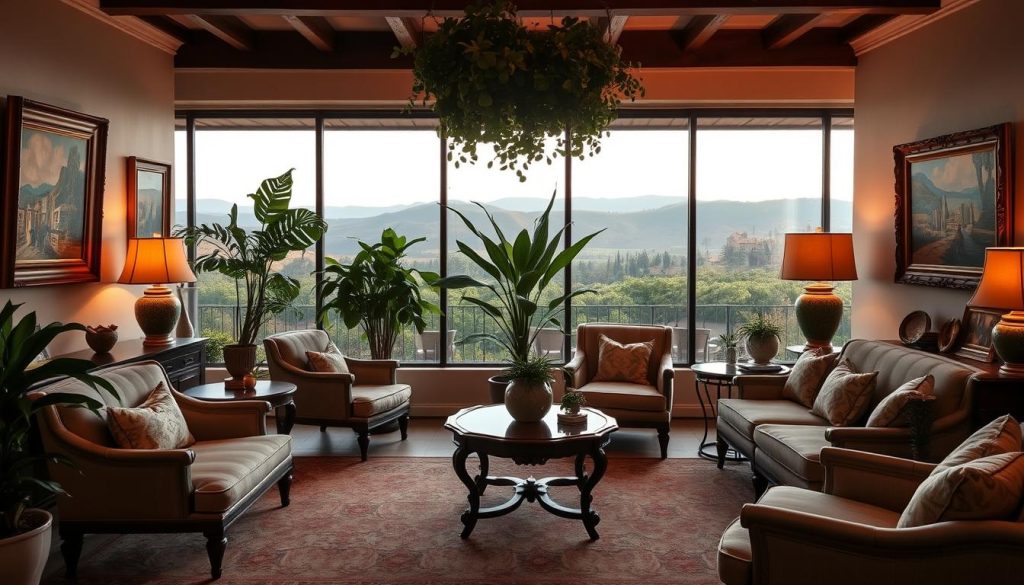
Boutique hotels are small and offer a special stay. They stand out from big chain hotels by being unique. Each one shows off the local culture and style, making it special.
These hotels are known for their stylish design and personal service. Guests get a close, personal feel that big hotels can’t match. This makes their stay memorable. The boutique hotel scene is growing fast, as people want real experiences that show off local life.
Knowing what makes boutique hotels special helps owners create the right experience. It’s key to join this exciting part of the hotel world. This way, they meet the changing needs of today’s travellers.
Why Choose Tuscany for Your Boutique Hotel?

Tuscany is a top choice for boutique hotels, thanks to its stunning landscapes and rich history. It’s famous for its beautiful views, ancient sites, and delicious food. This makes it a perfect spot for those looking to start a boutique hotel.
The area draws many visitors, from art fans to wine lovers. Every year, millions come to explore what Tuscany has to offer. Boutique hotels can offer special experiences that highlight the region’s culture, art, and food.
Tuscany’s mix of history and natural beauty is ideal for creating unforgettable stays. The market for hospitality in Tuscany is growing, offering great opportunities for new hotels to succeed all year round.
How to Start a Boutique Hotel in Tuscany, Italy

Starting a boutique hotel in Tuscany needs careful planning. You must understand the market well. This starts with looking at trends and demand. Knowing the hotel industry in Tuscany well can help your business succeed.
Assessing Market Trends and Demand
Doing a detailed market analysis is key. Look at these points:
- Visitor demographics to find your target market.
- Peak travel seasons to set the best prices and availability.
- What competitors offer to see how you can be different.
Don’t ignore tourism trends like eco-tourism and experiential travel. Knowing what travellers want helps you offer better services. This meets the demand in the hotel industry.
Defining Your Unique Selling Proposition
Creating a strong unique selling proposition (USP) is vital. Think about these:
- Unique design and architecture.
- A great location that adds to the guest experience.
- Services that meet each guest’s needs.
- An operational philosophy that shows your values or niche.
A clear USP attracts your target audience and boosts your market position. It shows what makes your hotel special. This can match current tourism trends, appealing to those seeking unique experiences.
Identifying the Perfect Location

Finding the right spot for a boutique hotel is key to its success. It’s important to think about how easy it is for guests to get there. Also, being close to tourist spots and having a nice area around can make a big difference. A location with cultural experiences, stunning views, or wine tours can really attract visitors.
Factors to Consider When Choosing a Location
When picking a spot for your hotel, keep these points in mind:
- Accessibility: Make sure there are easy ways for guests to get there, like close airports and train stations.
- Tourist attractions: Check if there are nearby places that people want to see, like historical sites or museums.
- Local amenities: Look for places like restaurants, shops, and entertainment that make guests’ stays better.
- Community vibe: See if the area’s atmosphere fits with what you want your hotel to be like.
- Seasonality: Know when the most people visit, as this can change how busy your hotel is.
Analysis of Popular Regions in Tuscany
Tuscany has many great places for boutique hotels. Here are some top spots to consider:
- Florence: Known for its art and museums, Florence is perfect for culture lovers.
- Siena: With its old buildings and the Palio, Siena offers a true Italian experience.
- Chianti countryside: This area is beautiful with vineyards, great for wine fans and those seeking peace.
Legal Requirements for Starting a Hotel

Starting a boutique hotel in Tuscany means you must know the legal basics. You need the right permits and follow health and safety rules. This makes sure your hotel is safe and runs well.
Getting a business licence is a big step. It shows your hotel follows local rules. Knowing Italy’s laws is key, as they’re different from others.
It’s also important to understand Italian tax laws. Staying on top of taxes avoids trouble with the government. Plus, knowing about employment laws helps keep your hotel running smoothly.
Working with local lawyers can help a lot. They know the hotel industry well and make sure you follow all the rules. This helps build a strong base for your hotel in Tuscany.
Designing Your Boutique Hotel: A Unique Aesthetic
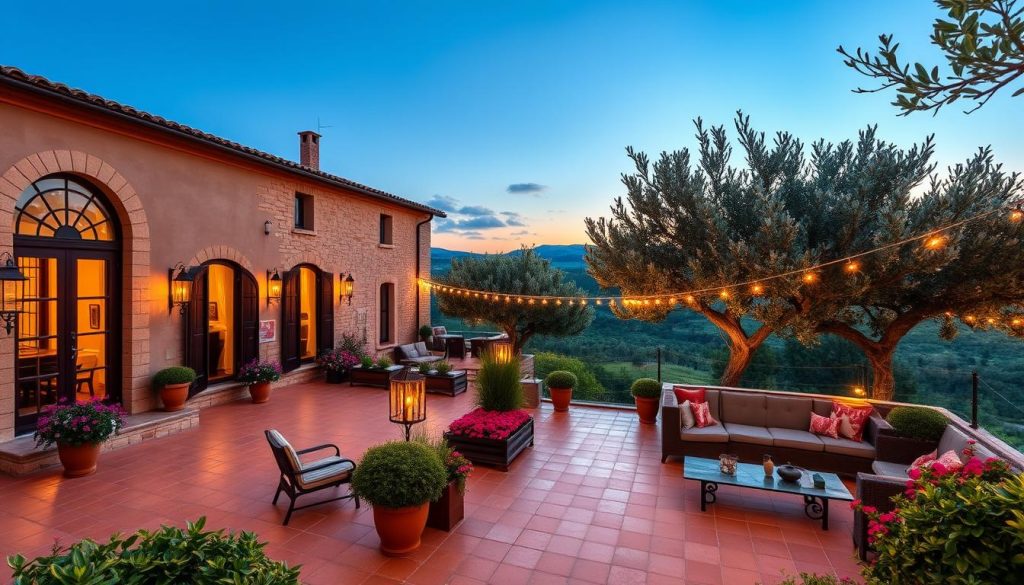
Good hotel design makes a big difference in how guests feel. Using Tuscany’s beauty in your design can make your hotel special. It shows off the local culture, making guests feel more connected.
Incorporating Local Culture into Your Design
Get inspiration from Tuscany’s history and culture. Use local materials like terracotta tiles and stone walls. This makes the hotel feel like it’s part of the place.
Adding artwork by local artists adds to the hotel’s charm. It makes the local culture shine. Spaces that tell stories and show the region’s character are key.
Choosing the Right Interior Decor
It’s important to mix comfort with style in your decor. Each area should be elegant but also useful. A consistent look throughout makes the hotel look great.
Working with local artisans for unique pieces can make your hotel stand out. It also helps the community, keeping the Tuscany spirit alive.
Creating a Compelling Business Plan

A good business plan is essential for a successful boutique hotel. It outlines the strategy, management, and operations. It also helps secure the needed financing. Financial projections are key, showing the hotel’s potential profit and sustainability.
Financial Projections and Budgeting
Adding detailed financial projections to your plan is important. It shows expected income and costs. Key areas to focus on include:
- Start-up costs like renovations, furniture, and marketing.
- Ongoing expenses, such as staff and maintenance.
- Income from rooms, dining, and events.
Knowing these helps in budgeting well. It ensures resources are used wisely. Forecasting sales helps create a realistic financial model that meets market expectations.
Marketing Strategies for Your Boutique Hotel
Marketing a boutique hotel needs creative strategies to showcase its charm. A strong brand is crucial, as it shares what makes your hotel special. Good tactics include:
- Partnering with local tourism boards for more visibility.
- Hosting themed events that appeal to guests.
- Using online ads to reach the right audience.
Telling compelling stories about your hotel can connect with travellers. It makes them want to stay with you. These strategies boost your hotel’s image and success.
Building a Memorable Guest Experience
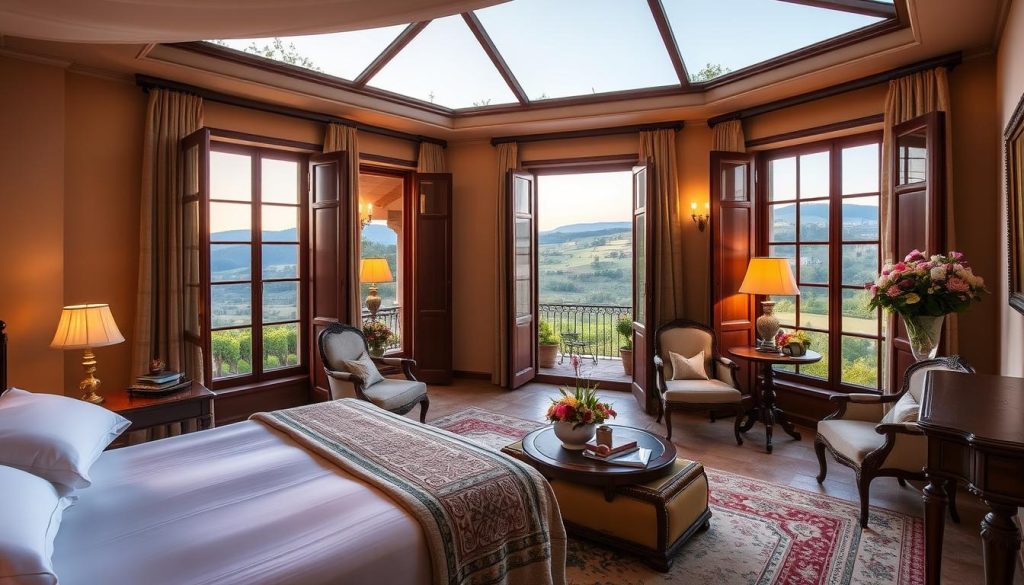
A focus on creating a memorable guest experience can set a boutique hotel apart from larger chains. Personalised services play a crucial role in ensuring that guests feel valued and catered to during their stay. Training staff to anticipate needs and provide tailored recommendations enhances overall satisfaction. Incorporating boutique hotel amenities, such as local excursions and gourmet breakfasts, adds significant appeal to the experience offered.
Personalized Services and Amenities
Guests appreciate when services are adapted to their preferences. Some effective ways to implement personalised services include:
- Offering customised welcome gifts based on guest profiles.
- Providing tailored itinerary suggestions that cater to individual interests.
- Ensuring staff are trained to remember repeat guests and their favourites.
Incorporating local flavours into boutique hotel amenities further enhances the guest experience. Items such as artisan toiletries and locally sourced snacks create a unique touch that visitors will cherish.
Creating Unique Packages for Your Guests
Unique hotel packages can significantly enrich guests’ holidays, transforming a simple stay into an unforgettable journey. Consider the following offerings:
- Wine tasting tours featuring local vineyards.
- Cooking classes that highlight regional cuisine.
- Art workshops led by local artists.
These experiential packages not only provide added value but also cater to diverse demographics, encouraging longer stays by attracting guests seeking authentic experiences. Each unique offering contributes to a bespoke guest experience that distinguishes your boutique hotel and solidifies its reputation in the competitive market.
Hiring and Training Staff

Getting the right staff is key to a boutique hotel’s success. Knowing who fits best in the hospitality world helps hotels build a team that shares their vision. It’s important to hire staff who not only have the right skills but also match the hotel’s values.
Profiles of Ideal Hotel Employees
A great hotel team is diverse but works together well. They make sure guests feel welcome. The ideal team includes:
- Hospitality management experts who know how to run things smoothly
- Guest services staff who are good at talking and solving problems
- Chefs who offer amazing dining experiences
- Housekeeping teams focused on keeping everything clean and tidy
With these profiles, each department works together, making guests’ stays perfect.
Importance of Customer Service Training
Training in customer service is crucial for a friendly atmosphere. Good training helps staff give excellent service every time. They learn to handle guest feedback well, keeping customers happy.
By following service standards, hotels build loyal customers. This leads to happy guests who come back and tell their friends.
Marketing Your Boutique Hotel

Marketing a boutique hotel in Tuscany needs careful planning. It’s important to show off what makes it special. Having a strong online presence is key, as most people look for places to stay online.
Investing in SEO and a good website helps you stand out. This makes it easier for people to find you in a crowded market.
Getting involved in local events and partnerships can really help. Hosting art exhibits or local fairs at your hotel can make people talk. It’s a great way to get your brand noticed and attract more guests.
Working with travel influencers is another smart move. Their followers might just decide to visit your hotel. Using public relations, like press releases, can also help tell your hotel’s story. This makes it a top choice in Tuscany.
Utilising Online Travel Agencies and Platforms

Online travel agencies (OTAs) are key for boutique hotels wanting to get noticed more. By being on sites like Booking.com, Expedia, and Airbnb, hotels can reach more people. These sites help hotels get seen by more guests and can even help fill rooms.
Using online travel agencies is very important. With a good presence on these sites, boutique hotels can:
- Get seen by people all over the world
- Use the latest booking tech
- Get help with marketing to find more guests
Working with these booking sites helps hotels make their listings better. This means they can compete well with others. By setting good prices and running promotions, hotels can attract more guests. This makes booking a stay in Tuscany easy and fun for travellers.
Leveraging Social Media for Maximum Exposure

Social media marketing is a strong tool for boosting hotel visibility. A good content strategy lets boutique hotels reach out to guests in a special way. By sharing engaging, eye-catching content, hotels can show off what makes them unique.
They can talk about local spots and what guests have to say. Sites like Instagram and Facebook are great for sharing real stories. This makes people more likely to book a stay.
Creating Engaging Content
Hotels need to make different types of content to grab attention. This includes:
- High-quality images and videos of the hotel and its features
- Peeks behind the scenes of the hotel’s daily life and staff
- Stories from guests that add to the hotel’s story
- News about local events and attractions to draw visitors
By keeping a consistent look and feel, hotels can grow their online presence. This attracts more people to their brand.
Influencer Collaborations to Boost Visibility
Working with influencers can really help hotels stand out. Partnering with influencers who match the hotel’s values creates real connections. They share their true experiences, adding a personal touch that people love.
Choosing the right influencers is key. It makes sure the messages reach the right people. This can lead to more bookings for the hotel.
Staying Competitive in the Market
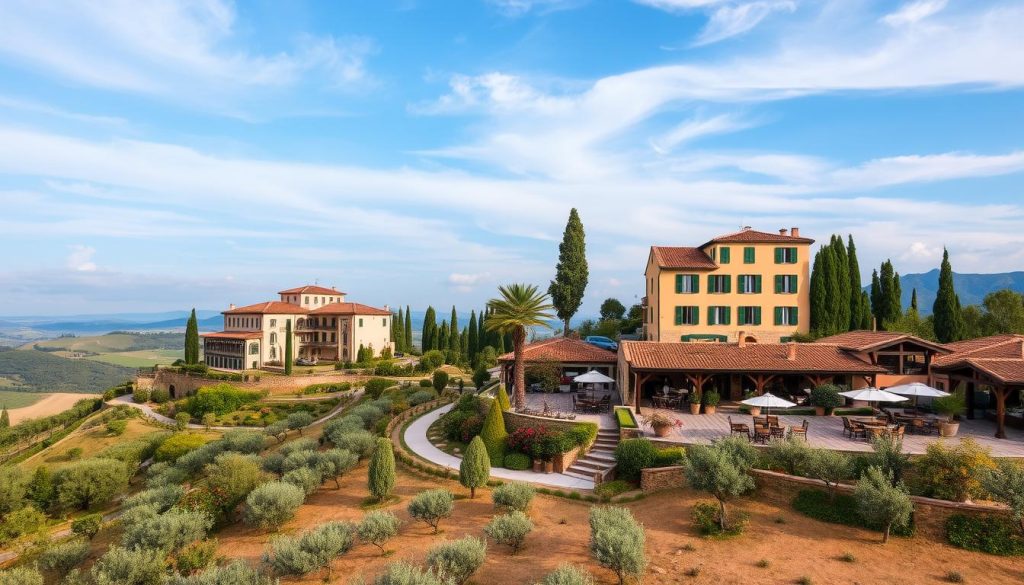
To stay ahead, boutique hotels must keep a close eye on their rivals. It’s crucial to know what competitors offer and how much they charge. This helps hotels find their unique spot in the market.
Guest satisfaction is key to staying competitive. Offering special packages that cater to luxury seekers can make a hotel more attractive. Listening to feedback and making improvements also helps build a strong brand.
Using different strategies is important to stay on top in the changing hospitality world. These include:
- Innovating services to stand out from competitors
- Utilising data analytics for informed decision-making
- Building strong branding that resonates with target markets
- Creating loyalty programmes that incentivise repeat bookings
Successful boutique hotels always change and grow. They keep their appeal fresh for their guests.
Building Relationships with Local Businesses
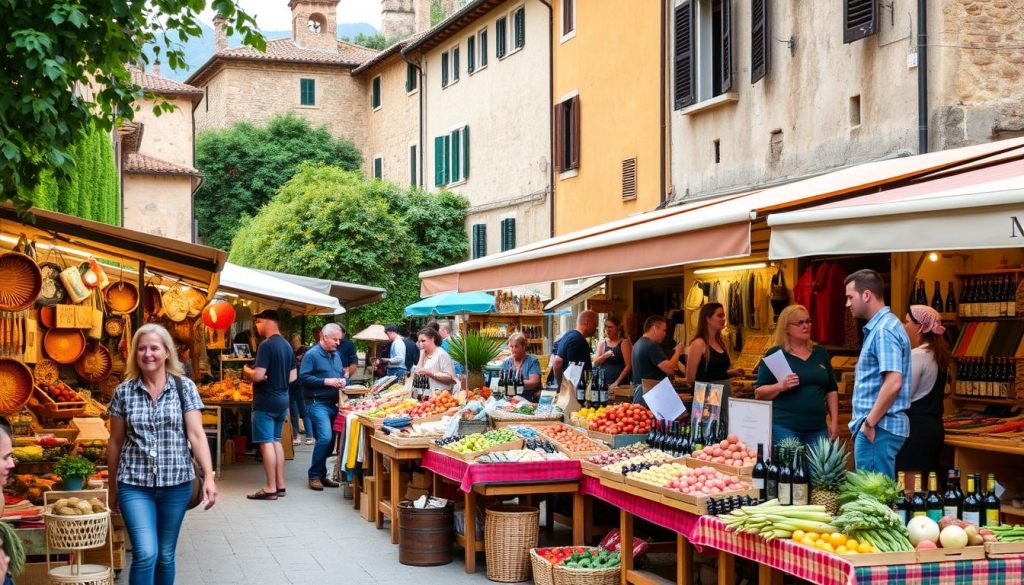
Creating strong bonds with local businesses boosts community spirit and makes a boutique hotel more appealing. Partnerships with local businesses are key to a hotel’s success. They bring many benefits to both the hotel and the community.
Collaborative Marketing Opportunities
Working together on marketing can open up new chances for everyone. Boutique hotels can team up with local eateries, wineries, and craft shops. This leads to:
- Cross-promotional campaigns that show off each other’s goods.
- Package deals that mix hotel stays with local experience vouchers.
- Social media posts that highlight community events.
These efforts make guests’ stays better and strengthen the hotel’s connection to the area.
Providing Local Experiences for Guests
Offering real local experiences makes a stay unforgettable. Guests can enjoy:
- Culinary tours that explore local food.
- Guided vineyard tours that show off the area’s wine.
- Workshops with local artists that dive into the culture.
Supporting these activities helps boutique hotels become important in the local tourism scene. They create lasting memories for guests and help local businesses get noticed.
Evaluating and Adapting Your Business Strategy
Regularly checking how your boutique hotel is doing is key to success. Look at things like how full your hotel is and what guests say. This helps you see if your plans are working well.
It’s also crucial to keep an eye on what’s happening in the market. By understanding what guests want now, you can make changes to meet their needs. Always looking for new ways to improve keeps your hotel growing in a busy field.
Being able to change and grow is at the heart of good hotel management. Encourage feedback, be open to new ideas, and stay ahead. This way, you’ll make your guests happier and keep your hotel at the top in Tuscany’s lively hotel scene.

